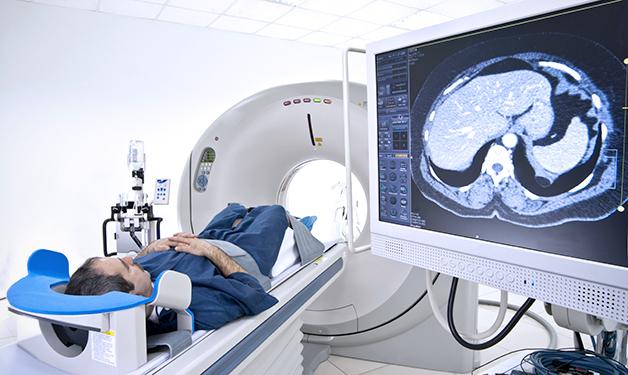
Tracer could be more accurate in detection–and also lead to more successful treatment.
Dr. Philip Cohen, a Research Scientist with Vancouver Coastal Health Research Institute (VCHRI), has spent 35 years studying how to track and treat cancer using nuclear medicine—a medical specialty that uses radioactive substances in the diagnosis and treatment of disease.
As a clinical professor of radiology at the University of British Columbia, Dr. Cohen has seen trial after trial fail to significantly improve detection and treatment options. But he is very excited about a new tracer he’s testing for prostate cancer.
“I think the word breakthrough gets overused—but this is the closest to a breakthrough I’ve seen in my career.” Dr. Cohen says a new compound he’s investigating not only promises to be more accurate in detecting prostate cancer at an early stage, but could also be a more effective way of treating the disease.
99mTc-MIP-1404 is a radiotracer that binds to a protein called PSMA (prostate-specific membrane antigen) commonly found in prostate cancer. This new compound acts as a homing molecule that travels through the body, finding PSMA in cells and binding to it. It then “lights up” on a scan, indicating where prostate cancer is located and how much of it there is.
Currently, prostate cancer is diagnosed with a Prostate Specific Antigen (PSA) test, followed by an ultrasound and biopsy to confirm malignancy. Patients are then offered surgery, radiotherapy or a watch-and-wait approach. Prostate cancer is the most diagnosed cancer for men and kills about 4,000 Canadian men each year.

That ability to seek out and find prostate cancer outside the gland—at a very early stage when bone scans and ultrasounds might not pick it up—has huge implications. If the cancer is found in the lymph nodes and bones (common sites for spread), the decision to surgically remove the prostate gland may change. On the other hand, if there is accurate information of no spread, patients and doctors can have more assurance that active surveillance is appropriate and opt to hold off on surgery and its possible complications.
Dr. Cohen’s study focuses on prostate cancer in the gland itself. Patients with prostate cancer who have chosen to have surgery to remove the gland will be scanned at Lion’s Gate Hospital after an injection of the new tracer compound. After their surgery, the gland will be biopsied and actual disease occurrence will be compared to the findings of the scans.

Dr. Cohen says a big advantage with the new compound is that it can be seen on regular nuclear medicine cameras (like CTs and MRIs). It doesn’t require a special PET scanner—which current tests do—so it can be performed in more hospitals, with more patients.
Potential for targeted treatment
Dr. Cohen says the most exciting application of the new compound could actually be in fighting prostate cancer. “We can attach an agent to the compound to kill prostate cancer cells. The tracer could be injected into the body with the cancer-killing agent attached. It can then seek out and destroy prostate cancer cells.” Dr. Cohen says researchers in Germany have initial indications that radioactive agents attached to the compound can be very successful in destroying prostate cancer cells when the compound binds to PSMA’s.
Dr. Cohen’s study is part of a large multi-centre trial. Johns Hopkins, the Cleveland Clinic, as well as Canadian sites like the Jewish General Hospital in Montreal and the Calgary Prostate Centre are other centres taking part.
“I think this compound is going to revolutionize the whole field. Nuclear medicine started out as a way to treat disease. But we haven’t had many successes and over time the field became more focussed on diagnosis of disease. This new agent could fulfill that original goal,” says Dr. Cohen.
Dr. Cohen is actively recruiting patients for the trial. He encourages men who are candidates for prostate gland removal to speak to their doctors about taking part. Participants will be asked to have one additional scan after an injection of the new tracer compound. Dr. Cohen hopes more men will be made aware of the trial and opt to take part.
“This agent is opening up significant advances in treatment and the only way to get it approved for use is to get trials done as quickly as possible.”
Learn more about the Prostate Cancer Trial.


